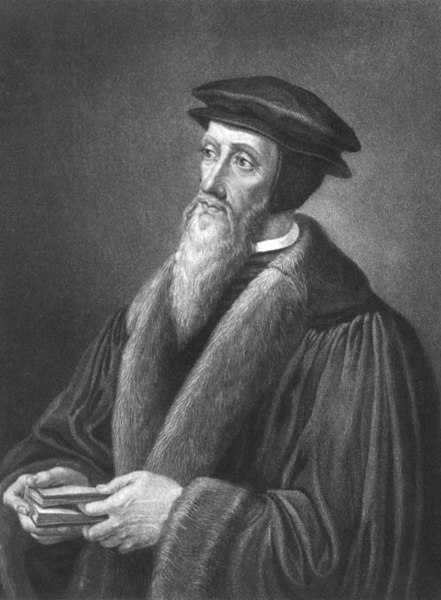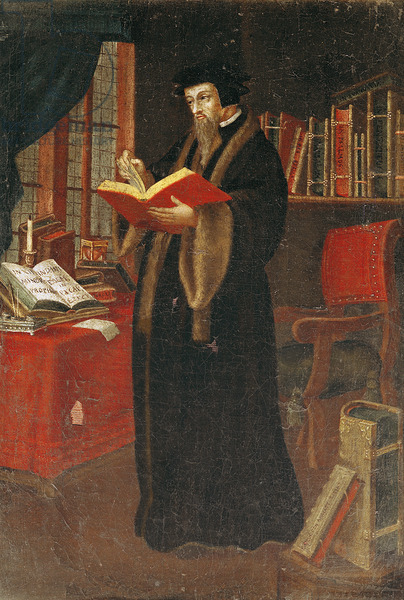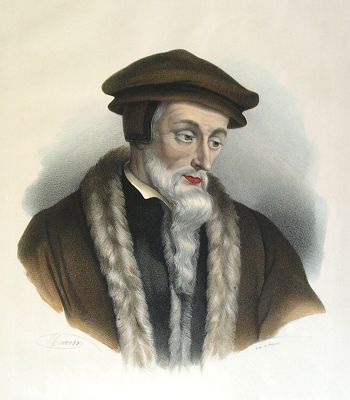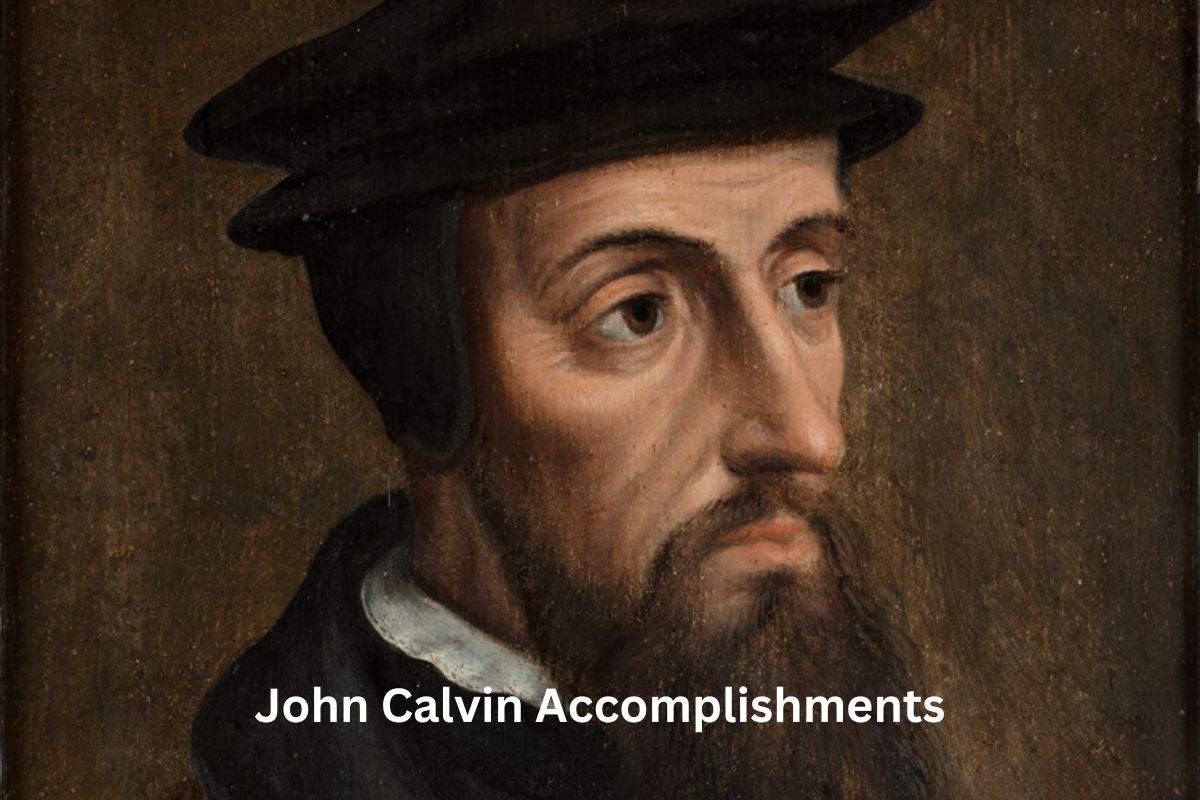John Calvin (1509-1564) was a French theologian and pastor who became a central figure in the Protestant Reformation. Born in Noyon, France, he initially studied law but later converted to Protestantism.
He is best known for his theological work, “Institutes of the Christian Religion,” which laid the foundation for Calvinism and Reformed theology. Calvin served as a pastor in Geneva, Switzerland, where he implemented ecclesiastical reforms and established a model of church governance.
His doctrine of predestination and his emphasis on God’s sovereignty in salvation had a profound impact on Protestant thought. Calvin also founded the Geneva Academy (later the University of Geneva), contributing to theological education and the spread of his ideas across Europe.
His writings, commentaries on Scripture, and commitment to biblical scholarship remain influential to this day, and his legacy endures in Reformed and Presbyterian traditions worldwide.
Accomplishments of John Calvin
1. Development of Calvinism
John Calvin is most renowned for developing the theological system known as Calvinism. This system, also referred to as Reformed theology, had a profound impact on the Protestant Reformation.
Also Read: Facts About John Calvin
Calvin emphasized the sovereignty of God in all aspects of life, particularly in matters of salvation. He outlined his theological ideas in his seminal work, “Institutes of the Christian Religion,” which went through several editions and became a foundational text for Reformed theology.
Calvinism includes the “Five Points of Calvinism” or “TULIP” acronym, which summarizes key doctrines related to God’s sovereignty and salvation.

2. Doctrine of Predestination
One of the central tenets of Calvinism is the doctrine of predestination. Calvin believed that before the foundation of the world, God chose some individuals for salvation and others for damnation, not based on their merits but solely according to His will.
Also Read: Timeline of John Calvin
This concept, often summarized as “double predestination,” stirred theological debate and remains a defining characteristic of Calvinist theology.
It profoundly influenced how Calvinists view God’s sovereignty and human free will, sparking discussions on issues of divine foreknowledge and human responsibility.
3. Pastoral leadership in Geneva
Calvin’s contributions extended beyond theology; he played a pivotal role in the city of Geneva, Switzerland, as a pastor and reformer.
In 1536, he was invited to Geneva, where he helped implement significant ecclesiastical reforms. He worked to establish a reformed church governed by pastors and elders rather than a hierarchical structure.
Calvin emphasized the importance of qualified ministers who were skilled in biblical exegesis and preaching. His influence in Geneva transformed the city into a model of a Reformed Christian community with an emphasis on moral discipline, worship, and theological education.
Calvin’s leadership in Geneva became a blueprint for Reformed churches worldwide, shaping the structure and organization of many Protestant denominations.
4. Founding of the Geneva Academy
John Calvin’s contributions extended to education. In 1559, he played a pivotal role in establishing the Geneva Academy, which later evolved into the University of Geneva.
This institution became a center for the dissemination of Reformed theology and the training of ministers and scholars. The academy provided a rigorous education that included instruction in theology, the humanities, and the sciences.
Many students from across Europe came to study there, and they would go on to spread Calvinist ideas and principles throughout their home countries. The University of Geneva continues to be a prestigious educational institution to this day.

5. Commentaries on Scripture
John Calvin’s commitment to biblical scholarship is evident in his extensive series of commentaries on various books of the Bible. These commentaries are highly regarded for their depth, clarity, and theological insights.
Calvin’s approach to biblical interpretation emphasized the literal meaning of the text and sought to uncover the theological principles and practical applications of Scripture.
His commentaries remain influential in the field of biblical studies and are frequently referenced by theologians, pastors, and scholars for their exegetical value.
6. Influence on Reformed liturgy and worship
Calvin had a significant impact on the way worship services were conducted in Reformed churches. He advocated for simplicity and reverence in worship, emphasizing the centrality of Scripture.
Calvin believed that worship should focus on the Word of God and the preaching of sermons. Consequently, the worship services in Geneva and in Reformed churches influenced by Calvin often featured prolonged, expository preaching of the Bible.
The simplicity of Reformed liturgy, the use of psalms in singing, and the emphasis on the preached Word of God became defining characteristics of Calvinist worship practices. These principles continue to shape the worship traditions of Reformed churches around the world.
7. Establishment of a theocratic government in Geneva
During his time in Geneva, John Calvin worked to establish a theocratic form of government. This meant that the church and the state were closely intertwined, and religious and moral principles influenced the laws and governance of the city.
Calvin sought to create a disciplined and godly society in which moral standards were upheld, and public behavior was regulated according to Christian ethics.
While this approach aimed to create a virtuous community, it also led to strict enforcement of moral codes and occasionally resulted in controversies and conflicts.

8. Advocacy for religious tolerance
Despite his role in the execution of the heretic Michael Servetus, John Calvin paradoxically advocated for some degree of religious tolerance in certain situations. He believed in the separation of church and state, with each having its own sphere of authority.
While this did not translate into complete religious freedom, as we understand it today, Calvin’s ideas laid the groundwork for later developments in religious liberty and the principle of the separation of church and state, which became integral to Western political thought.
9. Prolific writing and correspondence
John Calvin was a prolific writer and engaged in extensive correspondence with theologians, leaders, and scholars across Europe.
In addition to his major work, “Institutes of the Christian Religion,” he authored numerous books, treatises, and letters on theological, ecclesiastical, and practical subjects.
His writings played a crucial role in disseminating Reformed theology and shaping the theological landscape of the Reformation era. His letters also provide valuable insights into his personal and theological life and his interactions with contemporaries.
10. Lasting legacy in Protestantism
John Calvin’s legacy is perhaps his most enduring accomplishment. His theological system, ecclesiastical reforms, and writings significantly influenced the development of Protestantism, leading to the emergence of various denominations with Calvinist roots, including Presbyterianism, Reformed Baptists, and Congregationalism.
Calvinism had a profound impact on the theology, worship practices, and governance structures of these denominations. His ideas continue to shape the beliefs and practices of millions of Christians around the world, making him a central figure in the history of the Protestant Reformation and Western Christianity as a whole.
